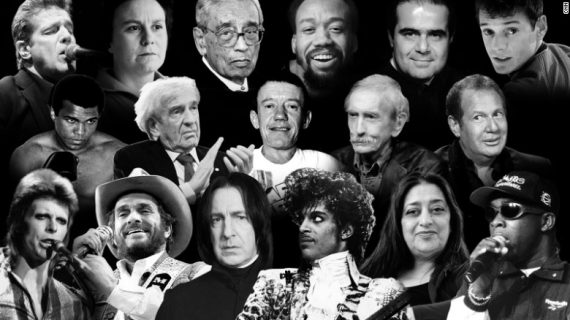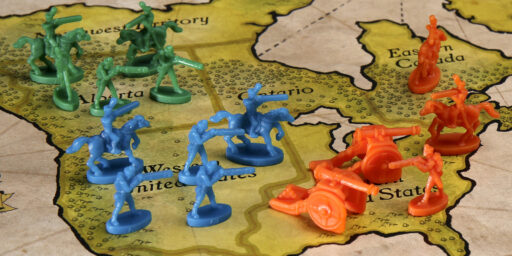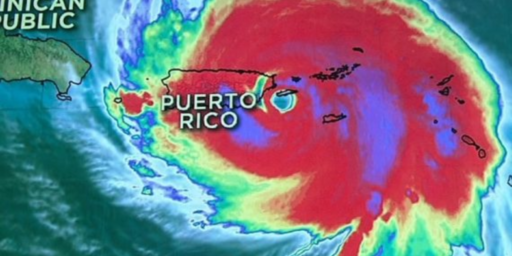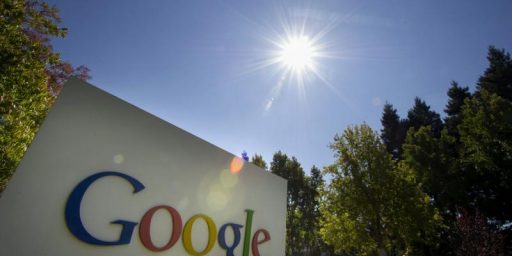Has 2016 Really Been An Unusually Bad Year For Celebrity Deaths?
It seems as though 2016 has taken many more celebrities lives than past years.
It started with David Bowie and Glenn Frey in January, continued with Garry Shandling, Merle Haggard, and Prince in March and April, and continued with Muhammed Ali, Gene Wilder, Leonard Cohen, Florence Henderson, and now George Michael. More so than many others, this past year has seemed as though many more celebrities have died in 2016 than in previous years. TThe whole year has seen a rash of such deaths to the point where it has become something of a popular meme on Twitter and Facebook where fans have noted that the year has been a particularly bad one for celebrities. The seeming epidemic of celebrity deaths has also led to a situation where people have somehow fallen into the habit of making celebrity deaths go viral even when those deaths occurred several years in the past. In the past several months, for example, “Rest In Peace” posts have appeared across social media for people such as M*A*S*H star Harry Morgan, jazz legend Dave Brubeck, and pretty much every star of the 90s sitcom The Golden Girls except Betty White, who is the only member of the main cast of that show still alive. Additionally, bad news about the health of a celebrity, such as the news over the weekend that Carrie Fisher, best known for playing Princess Leia Organa in Star Wars suffered a major heart attack on a flight from London to Los Angeles. Fisher is thankfully still alive, although her condition is unknown and could be potentially grim given some of the initial reports about what happened, but she still got sucked into the general conclusion that this has been an unusually bad year for celebrity deaths. Here at OTB, for example, we’ve posted fifty-two times since January about notable deaths, although many of those deaths have been in the political and legal worlds, the sports world, and those of who have made notable contributions to science and medicine, and have also included fellow bloggers and one long-time commenter who passed away during the last year.
CNN makes note of the phenomenon in a post today:
Prince and Glenn Frey, Harper Lee and Elie Wiesel, John Glenn and now George Michael — 2016 was savage in its taking of talented people.
From the music industry to screen stars and sports legends, if it feels like a large number of celebrities died in 2016, it’s true.
Linnea Crowther is the author of celebrity obituaries for the site Legacy.com.
In October, Crowther offered her analysis of celebrity deaths.
“As of September 30, the total number of celebrity deaths so far in 2016 is 71,” she wrote. “That’s more than the total number of celebrity deaths for the full year in any of the other years I looked at for this study. We’re already outpacing previous years by 5 to 20 deaths, and we still have three months to go.”
Since then, more stars have been added to the list including beloved TV parents Florence Henderson and Alan Thicke, veteran newscaster Gwen Ifill and singer-songwriter Leonard Cohen.
On Christmas Day, police in the UK confirmed the death of Michael, whose music helped define the 1980s.
The scope of celebrity deaths in 2016 seems especially heartbreaking, perhaps, because we have lost people who contributed so much — musicians David Bowie and Merle Haggard, rapper Phife -Dawg, actors Gene Wilder, Alan Rickman and Garry Shandling, women’s basketball coach Pat Summitt, boxing champion Muhammad Ali.
Memes, laments and the suggestion that Time’s Person of the Year should be “Death” have circulated in recent months.
Here’s an example of one particular creative meme about what many people have perceived:
This is NOT the @TIME ‘Person of the Year’ cover we want, it’s the ‘Person of the Year’ cover we must acknowledge! #Death #Rampage #MakeItSo pic.twitter.com/EfZkJIzK6P
— The Answer-Man (@ebonstorm) November 29, 2016
In reality, once you filter out the rare exceptional cases where famous people have died long before they reached an age where we’ve come to expect such things, such as is the case with George Michael, who I wrote about today, it doesn’t really appear to be the case. Millions of people die every year across the globe, after all, and no human life is infinite, so it’s only natural that we’d hear about someone famous dying and start to think that. Additionally, the rise of social media specifically and the Internet in general means that stories about celebrity deaths, including celebrities who have not been active publicly for years, spread very far very quickly. These two elements also provide something of a shared community in which people share memories of a particular person who was famous when they were younger, or who touched them in some way. The BBC itself made note of this and provided several explanations for why it appears that it’s happening:
[I]s this wave of celebrity deaths the new normal?
The answer is yes, according to the BBC’s obituary editor Nick Serpell, who ought to know about such things.
He said that the number of significant deaths this year has been “phenomenal”.
Looking at the basic statistics, there’s a very clear upward trend. Nick prepares obituaries for BBC television, radio and online, that run once a notable person’s death is confirmed.
The number of his obituaries used across BBC outlets in recent years has leaped considerably.
It’s a jump from only five between January and late March 2012 to a staggering 24 in the same period this year – an almost five-fold increase, according to research by the BBC Radio 4’s More or Less programme.
And that’s before counting some of the notable deaths in April, including American singer Merle Haggard, the former drug smuggler Howard Marks and this week’s two notable departures.
(…)
This all invites the question: why?
There are a few reasons, Nick Serpell says.
“People who started becoming famous in the 1960s are now entering their 70s and are starting to die,” he says.
“There are also more famous people than there used to be,” he says. “In my father or grandfather’s generation, the only famous people really were from cinema – there was no television.
“Then, if anybody wasn’t on TV, they weren’t famous.”
Many of those now dying belonged to the so-called baby-boom generation, born between 1946 and 1964, that saw a huge growth in population. In the US for example, the census bureau said that 76m people in 2014 belonged to the baby boomer generation – some 23% of the population.
Here in the UK, people aged 65 or older make up almost 18% of the population – a 47% increase on forty years ago.
With more babies born into the baby-boom generation, it meant more went on to eventually become famous.
Now, those famous former babies, aged between 70 and 52, are dying.
The age-bracket 65 to 69 is the one, in England and Wales for example, where death rates really start to increase – some 14.2 per 1,000 men in that age bracket died in 2014, compared with 9.4 per 1,000 in the 60 to 64 age bracket.
Among the major deaths this year, many – including Prince (57), Alan Rickman (69), David Bowie (69) and Victoria Wood (62) – were baby-boomers.
Another factor that may play into the impression that more celebrities are dying is that we have heard of more celebrities than before.
“Over the past 10 years, social media has played a big part,” Nick Serpell says.
Hours before Prince’s death was announced, tributes were paid to the American former wrestler and porn star Chyna, who died aged 45.
But the news of her death was not confined to the US – close to 400,000 tweets using the word Chyna were sent worldwide on Thursday, and interest peaked in cities such as Lagos in Nigeria and Lima in Peru.
These days, it is far easier to hear news of whether anyone has died than at any time in the past.
In other words, the reason that it appears that more celebrities are dying is a combination of several factors. First, many of the people who have died in the past year became celebrities during one of the biggest population increases in the history of the United States and other nations in the West, which means that there are more people to take notice of their passing and, likely, that there are more “famous” people than there used to be in the past. Second, the rise of new technologies and new genres of music and other forms of entertainment means that there is more of a likelihood that any particular day, week, or month, will include the death of someone that some significant group of people consider famous for some reason. Additionally, as I already noted, the existence of online social media and the Internet means that people are more likely to be exposed to things they otherwise might have missed in the past and that the news of someone passing away spreads more easily, and more rapidly than it ever has before. These phenomena also serve as a sort of shared community where people can share their grief over the passing of a favorite actor or singer..Occasionally, it seems as though some people are more emotionally impacted by the passing of a celebrity than they would be by the passing of a family member, although to be fair it’s often the case that people are less likely to share their grief publicly when the person who passes away is a family member even though it’s those occasions when seeking comfort from others might actually be most helpful. For most of us, the fact that a favorite star passed away is just another news item in an often busy news day whereas the passing of a family member is something that can reverberate for years afterward. The fact that people are more public in their grief over a celebrity death, then, may just be a reflection of fandom rather than a suggestion that their priorities are misplaced. All of this suggests that the impression that more celebrities are dying is likely to be one that continues for many years to come. For those of us who grew up in the 80s and beyond, many of these people have been famous for the better part of our lives. They’ve become a part of the culture and, thanks to the fact that music itself has become so personal, people are likely to take the passing of someone who arguably hasn’t been “famous” in years harder than they might have in the past.
All of this suggests that the impression that more celebrities are dying is likely to be one that continues for many years to come. For those of us who grew up in the 80s and beyond, many of these people have been famous for the better part of our lives. They’ve become a part of the culture and, thanks to the fact that music, television, and the movies are such a big part of our lives, means that we’re more likely to “know” the famous person being mourned in the Obituary section of a news website. So, yes it’s true that more celebrities have died in recent years than in the past, but that’s largely because there are more celebrities than their were in the past.
There’s another myth about celebrities that often comes up at times like this, namely the idea that celebrities ‘die in threes.’ As NBC News explained in a post from 2013, that’s largely a myth explained mostly by the way we think and how we process the news:
“Celebrities die every day — there’s no pattern at all of, course,” says Michael Shermer, author of “The Believing Brain” and publisher of Skeptic magazine, which investigates pseudoscientific and supernatural ideas.
He points out that there’s not even a real “rule” to the Rule of Threes. “There’s no rule! Is it six hours? Six days? Three weeks? What constitutes a celebrity? How big do you have to be?” Because if we’re talking A-listers all the way down to C- and D-listers, he says, “they die by the dozens every week!”
Human beings are naturally inclined to seek patterns, even when there are none to be sought.
“Patterns in death, patterns in misfortune – those are things that help us try to understand the universe or reality in a way that makes sense of it,” explains John Hoopes, a professor of anthropology at the University of Kansas who has written about the concept for Psychology Today. “In general, we’re very uncomfortable dealing with randomness.”
We take comfort in being able to explain some of the haphazard courses our lives take. And if we think we know when a pattern starts, we can also “know” when it ends. There’s an episode of “30 Rock” that hilariously illustrates the Rule of Threes belief – after two other celebrity deaths, Tracy Jordan and Jimmy Fallon each sincerely think they could be next. Fallon says at one point, “If some celebrity doesn’t die soon, I’m going to kill my first guest tonight. [Pause for effect.] It’s a dog who plays soccer.”
The phenomenon is sometimes called apophenia, Hoopes says.
“Apophenia is identifying significant relationships when, in fact, they probably don’t exist independent of the observer,” Hoopes explains.
Sitcoms aside, we see examples of this every time someone reports seeing the face of the Virgin Mary on their grilled cheese sandwich, or ascribing some kind of superstitious significance to glancing up at a digital clock exactly at 11:11.
And there’s something special about the number 3 in our culture: we have three bears, three blind mice, rock-paper-scissors, and phrases like “location, location, location,” “bloods, sweat and tears” or “the good, the bad and the ugly.” We have bronze, silver and gold medals, and Christians have the Father, the Son and the Holy Ghost. For Westerners especially, Shermer says, “The third data point is a critical point at which our brain goes, ‘There ‘s a pattern; that’s an intelligent signal, not a random noise.'”
But identifying patterns doesn’t always amount to superstitious or magical thinking. That’s essentially what science is, Shermer says – connecting dots that can explain climate change or how a virus spreads. It may stem from evolutionary usefulness.
Shermer says, “Imagine you’re a hominid on the plains of Africa, and you hear a rustle in the grass. Is it a dangerous predator or just the wind?” If you assume it’s a predator and bolt – you’re wrong, but there’s no harm done. “But if you think the rustle in the grass is just the wind and it’s a dangerous predator – you’re lunch. So we are the descendants of those organisms most likely to find meaningful patterns.”
So, yes it’s likely true that it will start to seem as if more celebrities are passing away than in the past, but no it’s not happening in threes or any other unusual pattern.
Photo montage via CNN







There have been a handful of shocking, early deaths, with Prince’s the most notable and George Michael perhaps close behind. But a whole lot of the “Damn You 2016!” commentaries have involved people dying in their 80s and 90s; that ain’t 2016’s fault.
“Millions of people die every day across the globe” – so a minimum of 730 million people die every year (365 days a year x 2) Let see, the planet has 7.40 billion people- wow did not realize our life expectancy was less than a labrador (<11 yrs.).
Humans look for patterns – even when they don’t exist. We see it in many avenues of life, especially politics where the Texas Sharpshooter Fallacy is so prominent.
@Raoul:
Yes, obviously an error on my part. One that I have now fixed.
Boomers make up the biggest population cohort and until recently completely dominated the popular culture. So famous boomers make up an oversized chunk of the “notable people” pool.
As boomer reach life expectancy, notable deaths are going to seem more common then they were.
I suppose that we could make a lengthy list of people who qualify as celebrities, then perform a statistical analysis to determine whether they suffer from shorter lifespans than or die from different causes in comparison to the regular population.
I suspect that we would find that they aren’t much different from the statistical norms, and that most of the differences are attributable to random noise in the data. We just have more celebrities than we used to have and a media that is constantly monitoring them.
Pop culture is largely a post-war phenomenon that really took off in the 60s, so they are reaching old age. For the slightly younger ones among them who have had long-term addiction issues, this is about the time that years of substance abuse will begin to catch up with them.
@Pch101:
I’d actually be interested to see a frequency chart for names mentioned in AP articles for each year.
I think it’s just that 2016 has sucked bigly on other fronts, so people are finding a pattern where there isn’t one, to help justify their hatred of the year. It’s a year that brought us the ugliest and most divisive campaign in modern history, won by the ugliest and most divisive major presidential candidates in modern history*.
I fear that we will all be reminiscing fondly upon 2016 before too long.
(*He really is not an attractive man. I’m having trouble thinking of any presidents less attractive — even Nixon had a nice smile. Taft was certainly fatter, but still, more in an aloof walrus way, which might be endearing)
I do miss Ron Beasley.
Well, aside from the ones who clearly went “early” like Prince and George Michael, of course the older ones are going to start dying off.
Still, even some of the older ones could have been expected to hang around longer–there were several who have died just short of 70, which these days isn’t considered particularly old.
It’s been a crap year for me, too, though, losing my grandfather, uncle, and a cousin in the same three-month period, which also saw the tragic loss of a good friend to brain cancer at 36.
And of course we got President-Elect Donald Trump.
So, pattern or not, 2016 sucked major ass.
I think a lot of people are depressed that Prince, David Bowie and others are dead, and Trump is alive
@Mikey: Wow! That’s a lot. I had two last year–my mom and a friend who would have been closer if I had not lived out of country for 8 or so years, and one this year–my uncle in NZ, who I had the chance to see in between bouts of cancer and while he was feeling very good and was still strong. Please accept my condolences at your losses. I can only imagine how hard that many all at once must be.
@Just ‘nutha ig’rant cracker: Thanks. Yeah, it was rough. I went to my grandfather’s funeral and my uncle did so much of it, even though he himself was wracked by pancreatic cancer. I left knowing I’d never see him again either. A couple months later we spoke on the phone. He told me what he planned to do. I told him I understood, couldn’t blame him at all. That night he took all his pain meds at once.
And in related news……..Keith lives on!
For me, I definitely started looking for the pattern when David Bowie and Prince started pushing daisies fairly early in the year, simply because those two were huge influences on my childhood.
@Mikey: So sorry to hear that. I had a year like that back in 1989, losing a grandfather, an uncle, and a second cousin within a 6-month time frame. It did indeed suck. I hope your 2017 is much better.
I keep hoping that Bowies death was just another artistic stunt that he pulled. His first single was the Man Who Sold the World, about a guy who fakes his own death. After all, this is the guy who dressed as a Nazi on the tonight show when they wouldn’t let him wear a dress. He is not afraid to be inappropriate.
Prince was depressing because he was supposedly so clean living and spiritual. Another true artist, though. ..And George Michael – hasn’t been a male voice like his since Freddie Mercury. Some real talent was lost this year,
@Stormy Dragon:
This. Boomers don’t realize how thoroughly they’ve dominated America culture. Prime example – listen to the Xmas music around you and check the dates on them. Easily 50-75% will be prior to the 70s allowing Boomers to recreate their youth every December.
This is being reported as news because Boomers and Gen X care but maybe not so much among Millennials. Betcha if someone like PewDiePie suddenly died it wouldn’t make the evening news because Boomers would be WTF is that??? I’d be curious to see the breakdown of ages in how many people actually find these deaths noteworthy – I had to explain to some younger cousins who he was and play some songs. They (like me when I was younger) were also shocked to discover it wasn’t immediately apparent to his fans that he was gay when several older aunt confessed crushes. Same with Bowie when he died. It’s most definitely a generational thing.
It’s also disconcerting that more and more of the ones that pass each year are close to my age or younger… but it beats the alternative.
Fisher’s gone now too. Her, George Michael and Vera Rubin within 48 hours. Awful.
I agree that we will see lots of celebrity deaths each year due to both increasing celebrity and the aging of the boomers. But this year has seen way too many icons go long before their time.
@Tony W: humans are making it a pattern? The fact is it’s become a pattern since January 2016 till now
@Rodney Dill:
Mark Hamil is 65. Luke Skywalker is older than Obi Wan Kenobi was when Star Wars came out.
Ralph Macchio is 55. The Karate Kid is older than Mr. Miyagi was when the movie came out.
Lisa Whechel is 53. One of the Facts of Life girls is older than one of the Golden Girls was when it premiered.
Alex Winter is 51. Kenau Reeves is 52. Bill and Ted are the same age Rufus was when Bill and Ted’s Excellent Adventure came out.
Whil Weaton is 44. Wesley Crusher is only three years younger than Captain Picard was when Star Trek the Next Generation premiered.
Mark-Paul Gosselaar is 42. Zach Morris is older than Mr. Belding was when Saved by the Bell premiered.
The present in Back to the Future (1985) is now further in the past than 1955 was when that movie came out.
@Stormy Dragon: When I was in my teens, I’d ride around in my parents’ car and they’d listen to the “oldies” on the radio. “Oldies” being the music of the 1950s they had grown up listening to.
I listened to “New Wave” and thought my parents were stuffy and old.
Today we’re as far from my “New Wave”–about 30 years–as my parents were from their “oldies.” Today’s kids listen to whatever they listen to and now I’m the one who’s stuffy and old.
What surprises me is that we’re still surprised when people die. What if we were to take note of, say, the amount of Texans who died this year. Or the number of vegetarians. Or the number of people with a certain blood type. These people are merely well-known. That’s their defining status. If we were to re-classify them into their home-state, their diet, their blood type, we’d likely get different data. But they’d still be dead. People die. It’s like, a “thing”.
@Senyordave: proof positive that celebrity worship is a disease!
who can feel sorry for some druggie who offs him/herself? good riddance.